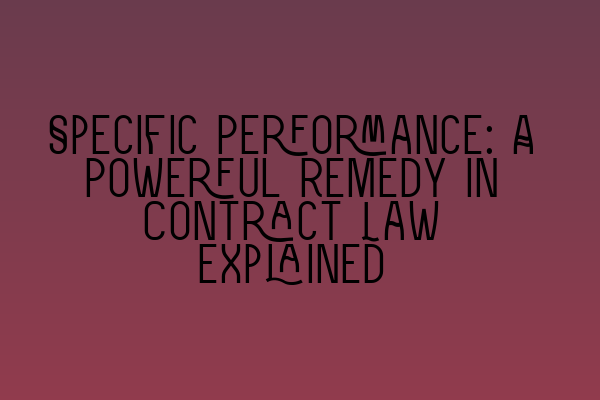Specific Performance: A Powerful Remedy in Contract Law Explained
In the realm of contract law, parties rely on the legally binding agreements they enter into to ensure that their contractual obligations are fulfilled. However, there are situations where monetary compensation may not be sufficient to fully address the harm caused by a breach of contract. This is where specific performance, a powerful and unique remedy, comes into play.
Specific performance is an equitable remedy sought by an innocent party to enforce the exact terms of a contract against the defaulting party. Unlike damages, which only provide financial compensation, specific performance requires the defaulting party to actually perform the specific actions agreed upon in the contract. It is essentially a court order directing the defaulting party to fulfill their contractual obligations as originally agreed.
One must keep in mind that specific performance is generally only available for contracts involving the sale of unique goods or those where monetary damages would be inadequate. For example, in rare cases, it may be sought for contracts involving land, artworks, antiques, or one-of-a-kind items. Additionally, specific performance can be requested in cases involving personal services contracts, such as employment agreements or contracts for the provision of professional services.
The availability of specific performance as a remedy is at the discretion of the court and subject to certain requirements being met. The primary requirement is that the innocent party must demonstrate that damages would not be an adequate remedy. They must show that the subject matter of the contract is unique, and no adequate substitute is available in the market. Additionally, they must show that they have performed their obligations under the contract or are ready and willing to do so.
To better understand how specific performance works in practice, let’s examine a hypothetical example. Imagine a situation where Party A enters into a contract to sell a rare piece of artwork to Party B for an agreed-upon price. Just days before the completion of the sale, Party A backs out of the deal, claiming a change of heart. In this scenario, Party B, as the innocent party, may seek specific performance to compel Party A to complete the sale and transfer ownership of the artwork as originally agreed.
It is important to note that specific performance is not available in all situations. There are certain situations where it may be deemed impractical or unfair to enforce specific performance. For instance, if the subject matter has substantially changed, if the contract involves personal services that cannot be forced, or if the court determines that the enforceability of specific performance would be against public policy.
In conclusion, specific performance is a powerful remedy in contract law that goes beyond mere monetary compensation. It allows an innocent party to seek a court order to compel the defaulting party to fulfill their obligations as agreed upon in the contract. While it is not available for all types of contracts, it can be a valuable tool in cases involving unique goods or situations where damages would be inadequate.
If you found this article informative, you may also be interested in reading these related articles:
– Unveiling Real-Life Case Studies: Insights into Legal Practice and Decision-Making
– Exploring Solicitor Salaries in the UK: Average Earnings and Factors Affecting Income
– Mastering Client Relationship Management: Skills for Solicitors to Enhance Trust and Loyalty
– Pursuing a Law School Education in the UK: Choosing the Right Path for Your Future
– Securing Training Contracts: A Roadmap to Becoming a Solicitor
Understanding the various remedies available in contract law is crucial for both solicitors and individuals involved in contractual agreements. By familiarizing yourself with specific performance and other remedies, you can effectively protect your rights and enforce the terms of your agreements.
